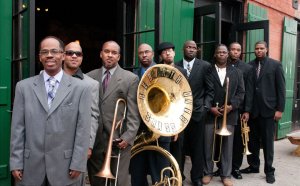
Military brass Band music
With the possible exception of saxophonists and euphoniumists, few musicians dream of a military career. Yet this path can provide a dependable income, solid benefits, and varied opportunities. “This is a good four year job for just about anyone. It can be a GREAT 20+ year job for many, ” explains Michael Mench, Commander of the US Air Force Band of Flight. A special thanks to Commander Mench, who provided some of the information presented in this article.
OPPORTUNITIES
Each branch of the United States military—Army, Navy, Air Force, Marines, and Coast Guard—employs several full-time music ensembles. There are two types of groups:
1) Premier bands. Ensemble members have a guaranteed post, without the worry about being transferred elsewhere. Hired musicians are immediately awarded the rank of E6 (rankings range from E1 to E9—higher is better). The 10 premier military bands are housed in Washington DC or attached to the service’s Academy: Annapolis, West Point, Colorado Springs, etc.
2) Regional bands. While some members stay with the same group for years, reassignment to other ensembles occurs due to manning shortages or openings in overseas bands. Entering status is determined by educational background, as is the case with most everyone else in the enlisted force. Musicians with college credit often begin at the rank of E3. Regional groups are housed on bases across the country and abroad.
The term band here does not mean wind band or marching band. In fact, most of these groups are umbrella organizations consisting of several performing ensembles. For example, the US Army Field Band consists of a concert band, chorus, big band, and pop combo. The US Air Force Band oversees six entities, including a string orchestra, chorus (cleverly entitled Singing Sergeants), brass band, and big band. Large ensemble members are often assigned to chamber groups as well, spanning the gamut of styles and instrumentations: Dixieland, baroque, Celtic, rock, pop, country/western, brass/woodwind quintets, etc.
Positions are available for:
- Instrumentalists (winds, strings, percussion, rhythm section)
- Vocalists
- Conductors
- Composers/arrangers
- Recording/sound engineers
- Non-performing staff
PROS
- Serving your country. Even if you’re not in combat (and few musicians are), military musicians provide a valuable and patriotic service.
- Job security. There are few music jobs that provide the level of security of the military. After obtaining a premier ensemble position, you can keep it until retirement (all ranks force retirement by age 55). Musicians can’t be fired or laid off…unless they monumentally screw up and are dishonorably discharged or reassigned.
- Opportunities. Many groups tour, record, and perform at high profile diplomatic ceremonies. Ensembles typically program a variety of musical genres. Members have the option of performing in chamber settings or being featured as a soloist.
- Health care. Comprehensive health care plans are available to members. The current level of coverage is generally better than years past.
- Education/college repayment. The military may pay down college debt, subsidize private lessons, and/or contribute to additional schooling. Military personnel are eligible to take advantage of the GI Bill.
- Other benefits. Members may live on base for free, or receive an allowance for housing. They also collect a food stipend. Allowances are non-taxable. Instrumentalists are supplied with professional quality instruments. These can only be used for official military engagements (not outside gigs).
- Elite entering status. When hired into a premier band, members are immediately granted the rank of E6. This is highly atypical for non-music personnel, who often work 5-10+ years to reach that status.
- Discipline. Joining the military is a great way to develop a more disciplined lifestyle (…by the way, you have no choice).
- Gigs on side. Obviously, military obligations take precedence, but most musicians line up extra work and income sources.
- Early retirement. You are eligible for retirement with 20 years of military service. If enlisting at 22, retirement is possible at the ripe age of 42. Retirees receive a pension equivalent to around 50% of their highest base pay.
CONS
Professional recruiters are quick to describe all the great reasons for joining the military, but are probably less forthcoming about the downsides.
YOU MIGHT ALSO LIKE


Share this Post
Related posts
Brass band music Downloads
Turn on safe browse to hide content that has been flagged by the community as not safe for work. Turn off safe browse to…
Read MoreHistory of Big Band music
On occasion, I get emails asking how the big bands came about and what caused them to fade from prominence. This is a difficult…
Read More










